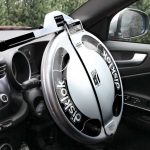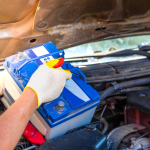If you’re a diesel driver, you’ve likely heard the term “DEF” thrown around, but do you know what it really is? Diesel Exhaust Fluid, commonly known as DEF, plays a crucial role in the performance and efficiency of modern diesel engines. As emissions regulations tighten, understanding DEF and how it works becomes increasingly important for anyone who relies on diesel fuel.
In this friendly and informative guide, we’ll break down the basics of DEF, explore its importance in reducing harmful emissions, and provide practical tips for using it effectively. Whether you’re a seasoned truck driver or a casual diesel vehicle owner, this essential overview will equip you with the knowledge you need to keep your engine running smoothly and contribute to a cleaner environment. Let’s dive in!
Understanding Diesel Exhaust Fluid and Its Importance

Diesel Exhaust Fluid (DEF) is a crucial component in modern diesel engines equipped with Selective Catalytic Reduction (SCR) technology. Comprised of 32.5% urea and 67.5% deionized water, DEF plays an essential role in reducing harmful nitrogen oxides (NOx) emissions. When injected into the exhaust stream, DEF reacts with NOx in the SCR catalyst, converting it into harmless nitrogen and water vapor. This not only helps in meeting stringent emission regulations but also optimizes the overall efficiency of diesel engines, ensuring they run smoothly while minimizing their environmental impact.
Understanding the significance of DEF is vital for diesel vehicle owners. Here are a few key points to consider:
Emission Control: DEF significantly lowers NOx emissions, contributing to cleaner air.
Compliance: Using DEF helps vehicles comply with Environmental Protection Agency (EPA) standards.
Performance: Proper use of DEF enhances engine performance and fuel efficiency.
Availability: DEF is widely available at fuel stations and auto parts stores, making it easy to access.
| DEF Characteristics | Details |
|---|---|
| Composition | 32.5% Urea, 67.5% Deionized Water |
| Freezing Point | -11°C (12°F) |
| Storage | Cool, dry place away from direct sunlight |
| Shelf Life | 3-5 years if stored properly |
How DEF Works to Reduce Emissions in Diesel Engines
Diesel Exhaust Fluid (DEF) is a crucial component in reducing harmful emissions from modern diesel engines. It primarily consists of 32.5% urea and 67.5% deionized water. When injected into the exhaust stream, DEF undergoes a chemical reaction facilitated by a catalyst within the Selective Catalytic Reduction (SCR) system. This process converts nitrogen oxides (NOx) — the primary culprits behind air pollution and smog — into harmless nitrogen and water vapor, effectively lowering the overall emissions. By integrating DEF, the vehicles can meet stringent emissions standards while maintaining performance and fuel efficiency.
Implementing DEF in diesel engines offers several benefits:
Improved Air Quality: Reduces NOx emissions significantly.
Enhanced Engine Performance: SCR technology allows for cleaner combustion, enhancing power output.
Compliance with Regulations: Helps meet EPA and CARB emissions standards.
Here’s a quick overview of the key benefits of using DEF:
| Benefit | Description |
|---|---|
| Emission Reduction | Significantly lowers NOx emissions from diesel engines. |
| Cost-Effective | Increases fuel efficiency and reduces overall operational costs. |
| Longer Engine Life | Improves engine health by minimizing harmful exhaust gases, leading to longevity. |
Best Practices for Using and Storing DEF
To ensure optimal performance and safeguard the integrity of your Diesel Exhaust Fluid (DEF), adhering to best practices for usage and storage is essential. Always store DEF in a cool, dry place, away from direct sunlight and extreme temperatures. Ideal storage conditions include temperatures between 12°F and 86°F (-11°C to 30°C). If you have to store DEF for an extended period, consider using a container specifically designed for DEF to prevent contamination. Moreover, avoid cross-contamination by ensuring that the equipment used for dispensing DEF is clean and free from any other fluids. Always use a dedicated DEF pump or nozzle to prevent any mixture with diesel fuel or other substances, which can affect the fluid’s effectiveness and your vehicle’s emissions system.
When using DEF, it’s important to be mindful of the dosage ratios. Typically, the recommended injection ratio is about 2-3% of diesel consumption, but always refer to the manufacturer’s recommendations for your specific engine type. Regular checks of DEF levels should become part of your routine maintenance to ensure you never run low, as this can lead to reduced engine performance or triggering a fault code. Monitoring key aspects, such as shelf life (which is approximately 1 year if stored properly), and keeping track of the container integrity will help in maintaining DEF quality. Implement these practices not only for compliance with environmental standards but also to enhance the longevity and efficiency of your diesel vehicle.
Choosing the Right DEF for Your Vehicle and Maintenance Tips
When it comes to choosing the right Diesel Exhaust Fluid (DEF) for your vehicle, understanding the specifications and guidelines of your diesel engine is crucial. Most modern diesel vehicles will require DEF that meets the ISO 22241 standard. Not all DEF products are created equal; some may contain impurities that can damage your engine, so it’s essential to purchase DEF from reputable suppliers or manufacturers. Look for packaging that highlights certifications and guarantees the purity of DEF, as this will ensure optimal performance and emissions control.
In addition to selecting the right DEF, regular maintenance practices can prolong the life of your diesel system and enhance efficiency. Here are some useful tips to keep in mind:
- Ensure the DEF is stored in a clean, cool, and dry environment to prevent contamination.
- Always check the DEF level before long trips and refill as needed to avoid running low.
- Inspect your DEF injector and pump periodically for any blockages or leaks.
- Do not mix DEF with other fluids, as this can lead to system malfunctions.
Q&A
Q1: What does DEF stand for?
A1: DEF stands for Diesel Exhaust Fluid. It is a non-toxic solution made of purified water and urea, designed to reduce harmful emissions produced by diesel engines.
Q2: Why is DEF important for diesel vehicles?
A2: DEF is crucial for modern diesel vehicles equipped with Selective Catalytic Reduction (SCR) technology. It helps convert nitrogen oxides (NOx) emissions into harmless nitrogen and water vapor, significantly reducing air pollution and meeting regulatory emissions standards.
Q3: How does DEF work in a diesel engine?
A3: When a diesel engine runs, it emits NOx gases. DEF is injected into the exhaust stream, where it mixes with the hot exhaust gases. The heat causes a chemical reaction, transforming NOx into nitrogen and water vapor, which are harmless and can be released into the atmosphere.
Q4: Where can I find DEF?
A4: DEF is widely available at truck stops, automotive parts stores, and some gas stations. It’s usually sold in jugs, tanks, or bulk, depending on your needs. Many commercial fleets also have access to DEF at their fueling locations.
Q5: How do I know if my vehicle needs DEF?
A5: If your diesel vehicle is equipped with SCR technology, it will have a DEF tank and a system to monitor fluid levels. You’ll typically see a dashboard warning light when the DEF level is low, prompting you to refill it.
Q6: How often do I need to refill DEF?
A6: The frequency of DEF refills depends on your driving habits and the specific vehicle. As a general rule, DEF consumption is about 2-3% of diesel fuel consumption. So, if you’re using a lot of diesel, expect to refill DEF more often.
Q7: Can I use regular water instead of DEF?
A7: No, using regular water or any other substance instead of DEF can damage your vehicle’s SCR system and lead to costly repairs. Always use genuine DEF that meets the API certification standards.
Q8: How should DEF be stored?
A8: DEF should be stored in a cool, dry place away from direct sunlight. It has a shelf life of about 12 months when stored properly. Make sure that the containers are sealed tightly to prevent contamination.
Q9: What happens if I run out of DEF?
A9: If you run out of DEF, your vehicle may enter a limp mode, limiting performance until the fluid is replenished. Some vehicles may not start at all without sufficient DEF, so it’s crucial to keep an eye on the levels.
Q10: Are there any environmental benefits to using DEF?
A10: Absolutely! Using DEF significantly reduces NOx emissions, which are a major contributor to air pollution and smog. By using DEF, diesel drivers can contribute to cleaner air and a healthier environment.
Conclusion:
Understanding DEF and its vital role in diesel emissions control is essential for diesel drivers today. By using DEF correctly and keeping your levels topped off, you can help ensure your vehicle runs efficiently while minimizing its environmental impact. Happy driving!
Insights and Conclusions
As we wrap up our exploration of Diesel Exhaust Fluid (DEF) and its crucial role in modern diesel engines, it’s clear that understanding this essential component can significantly impact your driving experience and vehicle performance. From reducing harmful emissions to enhancing fuel efficiency, DEF is an indispensable part of the driving landscape for diesel vehicle owners.
Whether you’re a seasoned driver or new to the world of diesel, knowing how to properly handle and utilize DEF will help you keep your engine running smoothly while also contributing to a cleaner environment. Remember to stay informed about DEF requirements for your specific vehicle, adhere to recommended maintenance practices, and always source your fluid from reputable suppliers to ensure the best quality.
Thank you for joining us on this journey through the ins and outs of DEF. We hope you feel equipped and empowered to make informed decisions about your diesel vehicle. Safe travels and happy driving!











